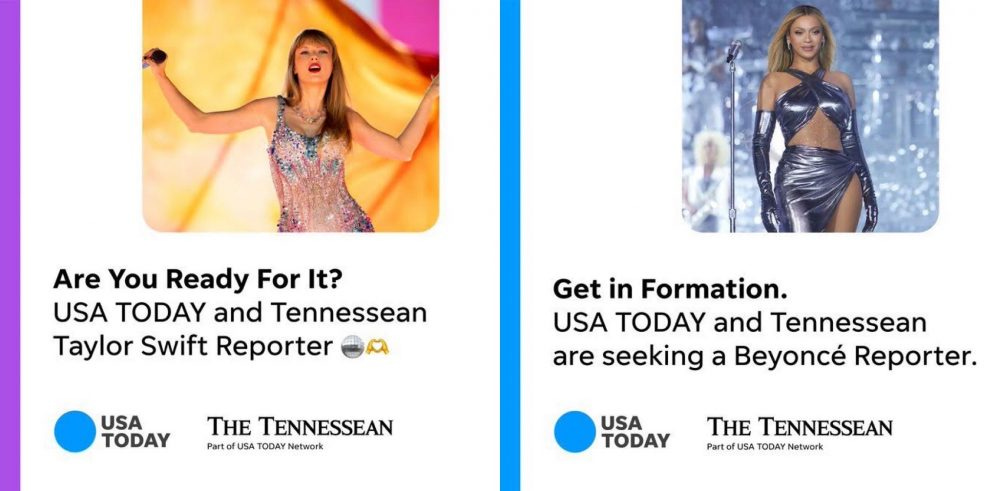About five days ago, two journalism jobs posted then went viral seemingly within the same click. Through USA Today, Gannet looks to hire a Beyoncé and a Taylor Swift reporter to cover those pop singers exclusively. Each reporter would cover new music and other outputs from the stars and the cult of fandom and influence that both continue to cultivate.
The news set off alarm bells for some journalists who see the shiny new role distracting from issues within news media, such as massive layoffs to local newsrooms owned by the newspaper chain. Some wondered whether the position would be more journalist or stan writing, potentially diluting the work of trained entertainment and music reporters, critics, and writers who cover the pop stars among other stars and issues within the industry. I wonder about cults of stardom, how cults deprive us of the ability to reason and see beyond deified humans, and what this celebrity culture means overall for the arts.
In 2014, bell hooks furrowed brows and sent the internet into a tizzy after she remarked on a panel at The New School that she sees “a part of Beyoncé that is in fact anti-feminist — that is a terrorist, especially in terms of the impact on young girls.” The words were unnecessarily harsh as the entertainer has never been accused of committing crimes nor abusing people in pursuit of power. However, the question or worry underlying the incendiary and brutal critique is potential food for thought. I don’t care not whether Beyonce is the perfect feminist ideal or the worst thing to happen to Black girls’ self-esteem. However, building up people too much leads to power imbalances and comes at some cost to the most vulnerable, which often are Black girls.
Beyonce and Taylor Swift may not be terrorists, but overstating their importance and focusing too much on their stardom distracts from other issues within arts and culture. Likewise, acting as if Swift and Beyoncé are the heads of some pop star dynasty cannot be healthy for either artists or a healthy arts ecosystem.
Fans wonder if Taylor Swift and Olivia Rodrigo are allegedly feuding after Swift and her writing team for “Cruel Summer” were retroactively added to the credits of Rodrigo’s song “Deja Vu.” The move seemed off, especially in the context of the very public trial with Ed Sheeran, who defended the similarities between his single “Thinking Out Loud” and Marvin Gaye’s “Let’s Get It On” by noting that it’s not good for creativity for folks to track how closely a pop song follows to its source material or inspiration.
Teenagers are iterative of their stylistic influences as they find their voice. It’s a fact. To penalize Rodrigo for being a young fan while making music seems cruel. (Taylor Swift most likely heavily borrowed from her idols like Shania Twain, Stevie Nicks, or Pat Benatar in her teen years.) And while the two pop singers attempted to squash rumors of discord at the recent VMAs, the situation leaves a bad taste in your mouth: as if Swift thinks of herself as the lord of the diaristic pop-style kingdom who subjects but pledges fealty to in the form of monetary offerings.
Likewise, focusing on the fact of Swift’s and Beyoncé’s stardom ignores the pipelines that led to both their careers, which have primarily been blocked by divestment from arts education in public schools. I cannot find the TikTok, but a channel, potentially The Breakdown, did a multipart segment about how Reagan defunding public schools, which hit arts education (music, visual arts, dance) the worst, directly affects the quality of singers that have made it. If they’re dynamic talents with ability, discipline, and technical skill, more often than not, they attended magnet schools or specialized private programs. Otherwise, those who cycled through public schools did not get the foundational arts education that would have taught them how to properly care for their voices, an issue I’ve noticed, predominately with up-and-coming Black singers. The creator argued that this is why artists of yesteryear seem to sound a lot better than contemporary pop singers.
Their music is undoubtedly popular, and their careers have been groundbreaking and newsworthy for countless reasons. Still, acting as if their lives need that much attention or focus ultimately cannot be healthy for media or a thriving arts and culture ecosystem. At the end of the day, I hope the journalists who receive these positions can make them their own and produce quality work for a livable wage and that the role leads to a sustainable career in arts and culture writing.
Leave a comment below about what you think about how much we prop up celebrities.
Random Thoughts
✍🏾 I am forever trying to get on a better writing schedule for this newsletter. Friday is the best day to write and post, but I’ve struggled to make the time. So here’s hoping I can better meet my internal goals than just the external ones.
📖 I have long commutes now and have enjoyed audiobooks to help me get through the commute with minimal annoyance. I’m currently listening to Pachinko and loving it!
🏅I think I want to start training to be able to run a 5K in less than 45 min, which is crazy because just a year ago, I thought I wasn’t a runner.
🍂I have experimented with various ways to make my own Starbucks copycat drinks at home, and I’m not sure it’s saving money yet or cutting down on my sugar consumption, but it’s still a fun fall activity.




